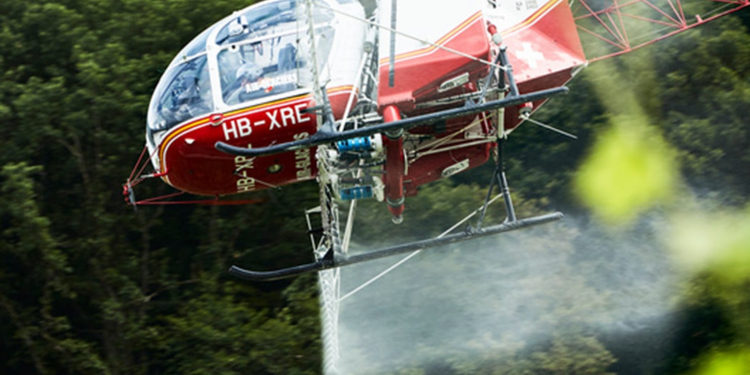Measurements on organic arable, wine and fruit-growing areas in Switzerland show that pesticides are transported for kilometers through the air. This also applies to hardly volatile substances.
Plant protection products (PPPs) applied to a culture are not limited to the treated plot, but can also be found on adjacent (organic) areas. This is the conclusion of a study by Greenpeace . The problem is actually known, but these new studies emphasize the large extent and also that the regulations applicable in Switzerland to avoid drift are insufficient, as Greenpeace writes in a communication .
The results fit with studies from Germany that came to similar results. A research by the University of Neuchâtel was also a burden Neonicotioden in the fields of Swiss organic farmers in the Central Plateau, which is explained by transporting the instrument.
Even non-volatile substances are transported far
There are instructions from the Federal Office for Agriculture FOAG , which are intended to reduce the risks associated with the use of plant protection products and also contain regulations against drift. For example, it is forbidden to spray in strong winds or a maximum height of 50 cm above the crop is prescribed for guiding the spray bar. Buffer zones must also be observed, e.g. B. to waters, living space or blooming plots. However, the regulations are specific for different PPPs, depending on whether a hazard or drift potential is assumed.
The Greenpeace study shows, however, that substances that are hardly volatile can also be spread with the wind. For example, glyphosate can adhere to dust particles and be blown away, writes the environmental organization.
Read here how you can prevent crop protection products from drifting.
Risk to health and organic farmers
Drifted PPPs contaminate ecosystems, agricultural crops and organic products, according to Greenpeace. For example, products from organically farmed areas can Sometimes they can no longer be sold with a label due to excessive exposure. This applies to a Valais winegrower in whose vineyards one of the measuring stations was located and is confirmed by the Bio Suisse media office in the Greenpeace announcement. Bio Suisse is quoted as saying that this could have dramatic financial consequences. However, the association was not involved in the investigation, it is made clear.
Get out of the «agricultural policy lockdown»
Greenpeace is demanding a package of measures on this matter from the federal government and parliament. Politicians must finally wake up from their “agricultural lockdown” and become active:
- Advancing the greening of agriculture, as discussed in the context of the agricultural policy 2022+ – despite the resistance of the «agar lobby»
- Prohibit helicopters to apply PPPs
- Regulate the use of drones for crop protection more closely
- Ensure that organic farming is protected from PPP drift
- Have independent studies carried out on the connection between various diseases (Parkinson’s, ALS and NH lymphomas) and PSM
- Permanent, nationwide digital monitoring of the use and airborne distribution of PPPs
Greenpeace appeals to consumers that those who buy organic support the urgently needed change in the food system.
Opposition from the helicopter association
In a statement, the Association romande pour le traitement des terres agricoles par voie aérienne (ARTTAVA) describes Greenpeace’s analyzes as false. In Valais, the study determined the presence of 15 different active substances in the air: 3 insecticides, 1 acaricide, 3 herbicides, 8 fungicides. First, there has never been any helicopter application of insecticides, acaricides or herbicides. Only the use of fungicides is allowed. Second, of the 8 fungicides found, only 3 were applied either by helicopter or drone near the measuring point. This means that 12 out of 15 plant protection products are not suitable for application from the air. In addition, the 3 fungicides could also have been applied from the ground. A conclusion about a source from the air is therefore not permitted.
Helicopters are strictly regulated
ARTTAVA regrets that Greenpeace published the study without first discussing it with the helicopter treatment experts. The helicopter is the most strictly regulated and controlled treatment device in Switzerland. Tests carried out in 2019 by the Canton of Valais with Agroscope on behalf of the FOEN showed that application by helicopter caused less drift than treatment on the ground.
Measured over six months at four locations
For their investigation, Greenpeace installed passive collectors at four locations on organic farms in Switzerland, who collected pesticides (PPPs) in the air for six months (May to November 2019). 213 active substances and metabolites were analyzed per site.
The locations represent different growing areas:
- Location A (Valais): viticulture and fruit growing
- Location B (Northwestern Switzerland): Arable farming
- Location C (Mittelland): arable farming
- Location D (Eastern Switzerland): fruit growing
Location A was the most heavily polluted, B the least. A total of 25 active substances and metabolites were detected (quantities from 20 nanograms could be determined), the most common:
- The fungicides folpet, captan, chlorothalonil (banned today) and cyprodinil
- The herbicides terbuthylazine, metolochlor and pendimethalin
- The insecticide chlorpyrifos (banned today)







